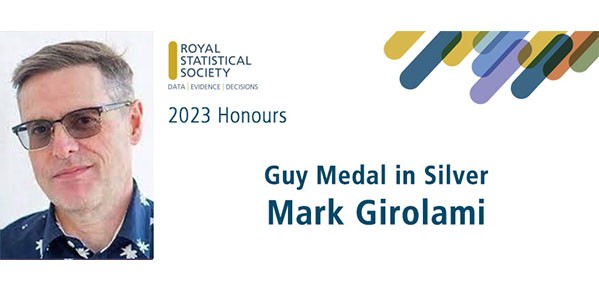
Professor Mark Girolami has been announced as this year's recipient of the Royal Statistical Society’s Guy Medal in Silver, awarded in recognition of his outstanding contributions to computational statistics and machine learning.
It is hugely exciting to be working at this research frontier in computational statistics and machine learning.
Professor Mark Girolami
The honour makes specific mention of Professor Girolami’s work on “differential geometric approaches to stochastic simulation for statistical inference”, as seen in the paper titled Riemann manifold Langevin and Hamiltonian Monte Carlo methods, co-authored by Ben Calderhead (University College London). The paper was published in the Journal of the Royal Statistical Society: Series B (Statistical Methodology) in 2011. This paper, which was read before the Royal Statistical Society, received the largest number of contributions to the discussion of a paper ever presented to the Society in its 189-year history.
Fast-forward to today, and these Monte Carlo methods are enabling the quantification of uncertainty in complex systems and natural phenomena as diverse as, for example, whole heart models, turbulent combustion, deep learning for artificial intelligence (AI), virus transmission, new materials characterisation and structural health monitoring.
Professor Girolami is the Sir Kirby Laing Professor of Civil Engineering at Cambridge, where he also holds the Royal Academy of Engineering Research Chair in Data-Centric Engineering (DCE) – a position that has since been extended for another five years until 2028. He is also the Academic Director for the Cambridge Centre for Smart Infrastructure and Construction (CSIC) and Chief Scientist at The Alan Turing Institute.
With expertise uniquely spanning the main data science and AI disciplines of computing science, statistical science, applied mathematics and engineering, Professor Girolami has published widely on many fundamental and challenging topics. These include the methodological development of Monte Carlo-based algorithms. He is also well known for pioneering a fundamental connection between information geometry and Markov Chain Monte Carlo (MCMC), leading to new and powerful computational methods for intractable Bayesian inference problems.
Further influential contributions include his work at the interface of statistics and cellular biology; the development of a theoretical underpinning to Deep Gaussian Process Learning; as well as an approach to solving nonlinear differential equations and characterising numerical errors using probabilistic calculus.
“I am truly honoured to receive the Guy Medal in Silver from the Royal Statistical Society,” said Professor Girolami. “It is an even greater privilege to be placed in such distinguished ranks as those of the past honourees, all of whom have made important and innovative contributions to the theory and application of Statistical Science.”
Dr Andrew Garrett, Royal Statistical Society President and Chair of the Honours Committee, said: “On behalf of the Royal Statistical Society, I offer my congratulations to this year’s recipients. Their work has not only strengthened the discipline, but led to greater understanding of many important issues.”
Some of Professor Girolami's ongoing research efforts have been covered in previous news highlights. These include:
- The probabilistic development of the Finite Element Method – a tool that provides computer-simulated solutions to otherwise unsolvable mathematical models.
- Leading the development, testing, certification and deployment of the world's first 3D printed stainless steel bridge.
- Developing machine learning transfer and Population Based methodology to improve structural health monitoring.
- Delivering a Digital Twin of UK airspace for the National Air Traffic Services to improve throughput and enhance safety.
- Boosting yield by up to 25% of the world's first underground farm, located in a disused tube line under Clapham Junction, with the development of Digital Twin technology.
Looking to the future, Professor Girolami said: “Machine learning and computational statistics as research disciplines, one might argue, can be viewed as cousins that are driving many of the advances we are seeing in AI. The need to perform statistical inference over ever larger data collections, as well as the growing use of more and more complex computational models, has never been greater.
"Just think of the enormous challenge it will be to perform kilometre-scale weather forecasting, which will require statistical calibration and computational simulation of massive scale mathematical models. Likewise, the rise of DCE is demanding new statistical methods and tools that will scale effectively, so it is hugely exciting to be working at this research frontier in computational statistics and machine learning.”
Adapted from a Royal Statistical Society news release.

